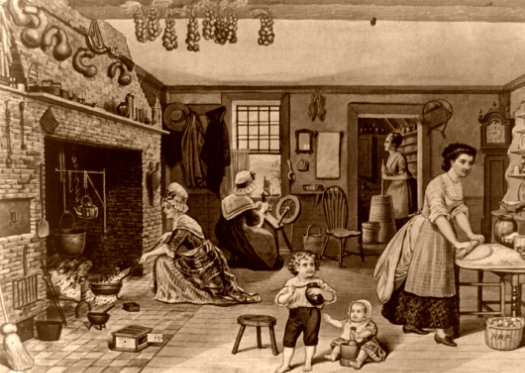Domestic Labor In A Marriage: Why It Becomes A Problem And How To Fix It

When your social media algorithm looks like mine, you are bound to encounter a lot of content on parenting. A common theme to the posts I see is about how labor is split up in the home between both partners, specifically when it comes to the children.
It’s no secret that the majority of the household labor is shouldered by the woman of the house, even when she is also working full-time. It’s also true that men today are much more likely to be involved in ways that our own dads never were. For instance, my mom told me that my dad never once changed a diaper. How is that possible? He had three kids!
So, even when you have a healthy relationship between two people who are fully invested in the care and well-being of the children, and a dad who is involved and enthusiastic, why does the domestic labor still tend to fall predominantly to Mom? Most importantly, how can we fix that to ensure we are all having happy relationships?
I think there are a few things at play here…
To start, of course you have the generations of expectation that the mother will naturally be the primary caregiver and the keeper of the home. That’s a current that runs through all of this. And it definitely helps explain why the sucky dads don’t help out around the house (because they use that expectation as an excuse to be lazy), but it doesn’t go deep enough to explain why Mom still gets stuck with most of the domestic labor in healthy, balanced relationships where Dad is eager to participate in the childcare.
To get to another root of the problem, I think it’s necessary to examine what it’s like to be a dad in the first few months of a new child’s life. This explanation is helpful for men to hear not only so they know they aren’t alone in their experiences, but in order to understand how Mom gets stuck as the default parent from early on in the child’s life.
When my wife was pregnant with our first son, we planned for her to take a whole year off from work right after he was born. The first few months were covered by her job but the rest was up to us to cover financially, which we were able to save for with the nine-month head start. Yes, we were very fortunate to be able to manage that and, yes, we worked very hard to make it a reality.
My job at the time did not offer any sort of paternal leave, whatsoever. None. I took ten days of PTO and then went back to work. This was long before I worked remotely so I was commuting into NYC every day. Because I used such a big chunk of my PTO right when my son was born, it meant I had even less time to spend with the family throughout the rest of the year.
The reason why we decided to have my wife stay home and me remain working was mainly because my son was to be exclusively breastfed, so he naturally had to be close to her all the time.
Bottom line: Our arrangement was the best thing for our family and it was what my wife and I agreed to. And it worked out exactly the way we envisioned.
But here is what wasn’t told to me before all this happened: the first few months of a baby’s life are kind of sad for dads.
If you’re in a situation similar to what mine was, there isn’t much you can do to comfort a really little baby who is only breastfed. My son hated the bottle, so whenever he was hungry (which was often) or fussy he wanted to be with his mom. And, honestly, it was beautiful watching him bond with my wife. But it was the kind of bond a dad can never share. He naturally had much more of a connection with her at that age.
None of this was all that unexpected, but the fact that he had such a connection with my wife AND the fact that he spent all day with her while I was at work definitely created a bit of a disconnect between me and the whir of daily domestic life. Sure, I saw him outside of work hours, but he was mostly asleep when I was home.
I missed a lot of special moments in that first year.
As far as working while my wife stayed home, I was sad that I HAD to do it, but happy that I was ABLE to do it. And that speaks to what is drilled into the minds of men from a very young age when it comes to what it means to be a dad, a husband, and a man.
What are women told about what it takes to be a good mom and wife? Are they told to work hard? Be warm and compassionate? Affectionate? Loving? Understanding? Trustworthy? Nurturing? Are they told they’ll need to be wiping butts, changing diapers, cooking meals, cleaning houses, helping with homework, making Halloween costumes, organizing playdates, and remembering names of other parents?
I have no idea because I’m not a woman. But I suspect that the ins and outs of childcare are more adequately outlined throughout the lives of women (starting when they are young) than men which lays down that aforementioned expectation that they will handle the majority of the housework/childcare, since that’s what a “good woman” looks like in society’s eyes.
But what are men told about what it takes to be a good dad and husband?
“Be a good provider.”
THAT’S what we’re told. That’s basically ALL we’re told. Ever since we’re little boys, we are told that being a good provider is the be-all-end-all of being a good man. We’re told that’s what will make our kids look up to us. That’s the VALUE we bring to the family.
Furthermore, what are young adult men told about how to be appealing to women? We’re told, again, that being a good provider is what women find sexy. Do you think we’re told that emptying the dishwasher or vacuuming the living room or making sure the right sippy-cup is clean for tomorrow morning is sexy? No. None of those things ever enter into the conversation when it comes to instilling in men what will make us attractive in the eyes of women.
We never hear that women want a domestic man. We hear that women want a steady, hard-working, goal-driven man with a good career. If a man is good domestically, that’s gravy. But what makes a man really high-value is his ability to provide.
That means that many well-meaning, good-hearted men have made the mental note of “Got it! All I need to do is be a good provider and I’ll be attractive to women and be a good husband and father!”
Now, imagine the disconnect when these men’s children are a little older. Maybe his wife has gone back to work full-time and is growing resentful of the fact that she does so much around the house and he does comparatively less. He might be confused as to why his wife is unhappy with him because he has been doing what he thought was the right thing all along!
“Wait a minute! Why is she upset? I’m a good provider. I work hard every day. This is exactly what I’ve been doing ever since the baby was born.”
So you have the “be a good provider” which fuels the man going to work while the wife stays home with the baby (also due to breastfeeding AND men possibly not having as much parental leave) which means that Mom is doing most of the housework.
But then there’s a shift in the household dynamic, like Mom going back to work. The key problem here is that there isn’t then the required shift in responsibility to effectively manage that new dynamic. Mom is just stuck with doing more. Men are still in the mindset of “But how can you be upset? I’m being a good provider! I’m doing what I’m supposed to do!”
This is what men need to be told…
“What you’ve been told your whole life about being a good man is going to change! Yes, you are doing a great thing by going to work while your wife is home with the baby and yes it sucks that you can’t share all those special moments the way she can. Keep your chin up because you’re doing exactly what the family needs. Remember, though, that in a little while you need to CHANGE what you’re doing! Your wife is going to go back to work which means she can’t possibly keep up with all the domestic stuff she was doing before. Now listen, this is crucial… your job at that point is going to be to take on as much of the domestic workload as you can IN ADDITION to what you were doing before. How you manage your previous responsibilities along with these additional demands will be the NEW measure of your fitness as a dad and husband.”
Think of running a family like running a company. If you’re on a team working on a handful of projects you might be fine chugging along for a bit doing the same thing. But then a new project comes along which requires everyone to shift focus. Do you just continue doing the same thing you’ve been doing for months? Or do you adapt and adjust to the new workload so that everyone is pitching in equally?
“But my wife is so good at all the household stuff! What kinds of things should I take on?”
Great question!
This is another area where well-meaning dads fall into a bit of a trap. Look, it’s totally ok to straight-up ask your wife what she would like you to take off her plate. But don’t be surprised if you get a bit of a wishy-washy answer. Your wife might say something like, “Just do whatever needs to get done” or “I shouldn’t have to tell you that the dishes need washing”.
If that sounds familiar, don’t fret. Here is a good way to think about how to effectively take on your share of the domestic tasks.
What is the goal of the moment? Or, what NEEDS to happen soon to keep the house running smoothly?
Is it almost bedtime and the kids are still running around screaming? Well, the goal of the moment is to get them ready for bed. They NEED to go to bed soon. Start prepping their jammies and bedtime books. Get their toothbrushes ready. Start encouraging them to wind down.
Has dinner just ended (the dinner your wife made)? The goal of the moment is to get everything cleaned up. Clear the plates from the table. Scrub some pans and put them away.
The goal of the moment should be important to you too! You should want to get the dishes clean and the kids in bed. If you and your wife are working towards the same goal of the moment, then you will naturally pick up whatever needs to get done in order to achieve that goal.
Now, no conversation about domestic work is complete without a discussion about the dreaded “mental load”. If you don’t know what the mental load is, then your social media algorithm REALLY doesn’t look like mine!
The mental load refers to the invisible work that is associated with any task.
Take something like making the kids’ lunches. Is making lunches hard? No, but there is a mental load associated with it. It might look like this: “Do we have enough peanut butter? I made them a PB&J yesterday so we probably don’t have enough peanut butter for both kids. I need to make sure I put peanut butter on the shopping list. Which kid will care about that more? What can I make the other one? Tuna? Perfect. Wait, didn’t he have tuna three times this week already? I should probably give him something different. Wait a second, isn’t tomorrow Friday? That’s pizza day. Ok, they’re both getting pizza. Great! Now, what snacks should I give them to go along with their pizza? Hmm.. Oh wait! I told them I would give them fruit-snacks as a special treat on Friday, so I don’t want to go back on my word. Did I make sure to get fruit-snacks at the store? Crap, he can’t have fruit snacks with his loose tooth!”
Pointing out the mental load is a way to make it clear that these seemingly “easy” tasks are preceded by a host of plans and considerations. And it can be exhausting.
But here is the truth about the mental load. The mental load is just the normal mental planning that accompanies adulthood. Any of the mundane tasks one completes throughout his or her day requires some sort of planning.
The existence of the mental load is only really a problem when there is an unequal division of labor. The unequal division of labor is the problem, not the fact that the mental load exists.
So men, if you’re taking on your fair share of the domestic workload, while also validating the effort your wife puts into her share, then the mental load won’t really be an issue.
Another common problem in couples when it comes to the domestic load is thinking that the YOUR work is harder! Do you think that going to work is harder than staying home and caring for a child and managing the home? Congrats, your wife probably resents you and you’re probably not taking on your share of the housework because you think it’s “easy” and she should be able to do it all.
On the flip side, though, does your wife think that staying home is harder than going off to work everyday and not spending time with the family? Well, I wouldn’t be shocked if you’re harboring some resentment towards her.
Neither partner can think that their work is harder than their partner’s. No one should have the monopoly on being tired. The truth is that both roles are hard in their own ways and easy in their own ways. If your wife is tired at the end of her day, don’t invalidate it by thinking, “Oh my God, she was home with a napping baby all day. How can she be tired?!” Think, “Wow, she really must have done a ton today to make her so tired. I really appreciate all she does for the family.”
As men, it’s important that we feel validated and respected. And you know what? It’s important for your wife, too.
Here’s another thing to consider: the division of labor is never going to be totally equal. It’s also going to fluctuate depending on the things you and your wife have going on. Striving for absolute equality is a losing game. If you’re both doing as much as you reasonably can, then that’s all anyone can ask.
None of this should come across as me blaming anyone for not automatically taking on their fair share of the domestic labor. It sometimes isn’t obvious what needs to get done, or what our wives would like us to get done. But it’s important to understand that that blind spot definitely exists! That blind spot is not your fault, but it is your responsibility to recognize that it’s there and work around it.
Like I always say: You’re a great dad. You’re doing your absolute best. Sometimes, though, you need to shift focus and apply your skills and hard work in different ways. That doesn’t mean that what you were doing before was wrong. It just means that you need to be open-minded enough to adjust your course if that’s what’s needed for the family.




Nicole Connelly
Love your writing and ideas Richard! You’re spot on!
richardjconnelly
Thanks so much, Nicole!